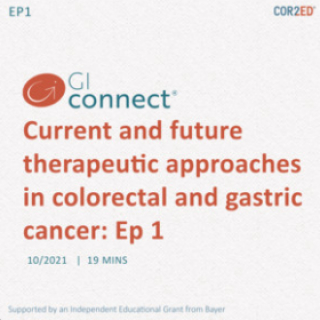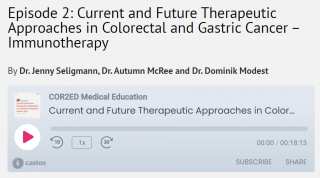Jenny Seligmann
So, welcome to our first GI CONNECT podcast. Thank you for joining us, so my name is Dr Jenny Seligmann and I’m a medical oncologist from the University of Leeds in the UK. And I’m joined by Dr Dominik Modest from the Charité University of Medicine in Germany and Dr Autumn McRee from the University of North Carolina USA.
So for our first episode we're going to discuss targeted therapy and metastatic colorectal and gastric cancer.
Firstly, I’ll just do a quick plug for our other episodes. So in our second episode we're going to be discussing immunotherapy approaches in advanced colorectal and gastric cancer. And in our third episode we're going to discuss future important developments.
So back to episode one, targeted therapies.
So I think we're all familiar with EGFR monoclonal antibodies and VEGF inhibitors. They form part of our standard practice and we’ve spent the past 10 to 15 years refining our patient populations and our chemotherapy backbones.
So for this episode I think we’re going to discuss more novel targeted approaches in both colorectal and gastric cancers. So let me get to my first question. So, what are the most practice-changing drug targets in colorectal cancer? Dominik I don't know if you want to take that first?
Dominik Modest
Thank you Jenny, I’m happy to take that one. Of course, I think, given the last years, with the exception of MSI and KRAS that we will cover in the following episodes, I think HER2 targeting is something that we have been dealing with every year in terms of small cohorts that were all, in fact, pointing to the decision that this target will arise, will be developed, further drugs are being implemented, so I think this is something that we will definitely take into focus for the next years.
And I think the other one is BRAF that we have been testing with minor consequences for many patients for many years, and where we have come to, I think, the situation where we kind of tailor treatment decisions from first to second line based on that biomarker. So I think both are not new in oncology but both emerge in colorectal cancer.
Autumn McRee
So I agree, I think, you know, the BRAF data is certainly a bit more solidified and its role in the second line of these patients. I think the data that was presented at ASCO 2020 and then, you know, ASCO GI of 2021 really showed that, from both an advocacy standpoint and a quality-of-life perspective, these patients do better with targeted therapy compared to chemotherapy.
I think the lingering question is what should we do for these people in the first-line setting? Are the targeted therapies going to play a role there, and we're still waiting for the data from clinical trials, but, you know, are most people still using chemotherapy in the first line?
I think, for my patients I tend to still use triplet therapy for my robust patients with, you know, with FOLFOXIRI, but I think that's where the question has not been answered is, you know, will these drugs play a role in the first line setting?
Dominik Modest
I think the curious thing for BRAF is that the thing that we thought we had understood, meaning FOLFOXIRI for everyone who can stand, has now been a bit put into doubt with a meta-analysis of the five trials that compared triplet to doublet chemotherapy that was published by the GONO group last year and for those who haven't read that, I think anticipated benefits that has been guiding us and was implemented in all guidelines, could not be reproduced in that meta-analysis.
So I think the key question that we thought was biological therapy, yes or no? So we have answered that now, but lost the security what to do in first line. And I think it's quite interesting because without a first-line standard, I would argue that we don't have one anymore, we can do anything basically.
We could even discuss, if BRAF testing in the first line has a big impact on treatment decision. I would still say yes, but less than a year ago.
Autumn McRee
I think, too in the past when we haven't had good targeted agents for these drugs their runway has been very short, and so I think all of us have felt inclined to try to get as much chemotherapy into them up front as possible, because we had, you know, survival times of less than a year.
I think now if we're going to be able to extend their runway with targeted therapies and we have a little bit more time to think strategically about how to sequence these drugs then we may not have to use such a heavy hitter as FOLFOXIRI in the first line setting, which you know I think for some of these patients it's just not an option if they're not robust enough to tolerate that.
Jenny Seligmann
So what kind of first line options do you think there would be? Do you think we’ll start to incorporate the targeted agents alongside chemotherapy? Do you think there's a role for the triplet drug targeted agent in the first line?
Dominik Modest
Well that's difficult questions. I think combination of chemo and biological therapy is what we all hope for, because the data of biological therapy alone, first line, as presented by the ANCHOR study were not convincing enough, I think, for the future to stimulate a Phase 3 design, so I think the trials we await is chemo plus/minus biological therapy in the first-line setting, so I think that's the biggest hope.
It's speculation to say, well it works, I guess it works, I hope it works, but I don't know. And for triplet and doublet, I would just say treat patients for objectives beyond BRAF. I mean if you have a fit and maybe potentially resectable patient who is young and doesn't have an EGFR-sensitive tumour so it's not RAS/BRAF wild type and left-sided, I think the question of triplets is, I think, anyway in the room, so you have to take that decision anyway, and I would, I think, just group the BRAF alongside those that are not candidates for doublet plus EGFR and for all of these I think it's chemo as much as necessary to reach clinical objectives plus/minus bevacizumab.
Autumn McRee
And I think, fortunately, the trials have been planned, and the trials are ongoing, and so this story seems to be a little bit further developed in terms of how we're supposed to sequence these drugs.
I think the story's a little bit more underdeveloped for the HER2 in colon just because the studies that we have typically have been single-arm Phase 2 studies, but I still feel like this is becoming a story that's promising enough that, you know, testing for HER2 in colon cancer, colorectal cancer should be considered standard of care.
Dominik Modest
I totally agree, I think, with HER2, I think, we are experiencing exactly the same as with BRAF, we're getting a Phase 2 trial each year that is convincing in itself but that doesn't give the big breakthrough like Phase 3 efficacy confirmation that we need to really implement that, but I think the evidence that is summing up over the years with the HERACLES trial and the HERACLES II trial and the MY PATHWAY data, I mean there's so many data now we're having on HER2 they're all small about that totally consistent, so I think we're really nearing the point where this breakthrough Phase 3 will take place, and then we will have exactly the same, we’re just a few years behind in the development.
But it's exactly the same as with BRAF, I mean we have been, I think writing proposals for BRAF studies, all of us for many years, knowing that BRAF inhibition in combination with EGFR somehow works until a company just did it.
And that was, I think the major problem, not that we have not an idea on how to treat these patients, it was just the big Phase 3 data that we were missing for so many years.
Autumn McRee
I think what's really interesting with the HER2 story is just with how many different drugs have been developed to target this therapy, so you know we all are familiar with the HER2 monoclonal antibody or trastuzumab, but when you look at all of these different studies, you know, there are some that use small molecules, there are some that target the internal receptor, there's some that target the external receptor.
I think the DESTINY trial that was presented at ASCO 2020, you know, was the first trial, to use an antibody drug conjugate and we now have an approval for that drug at least in the United States for gastric cancer. I think, when you look at the PFS times of the DESTINY study and even some of the other Phase 2 studies that Dominik mentioned, you know, I think it's hard not to get excited about these even though it's a small population of patients, you know, they're certainly outperforming what would be considered standard therapies in the general refractory colorectal cancer population. So I think this will be a really fun story to watch develop and, I suspect, at some point, this will be considered a standard approach for HER2-amplified colorectal cancer.
Jenny Seligmann
Sure great. So just to ask the same question but in gastric cancer, what do you think are the most practice-changing drug targets?
Dominik Modest
I think that trastuzumab deruxtecan, just to say this really complicated name of the drug, is something that, at least for HER2 gastric cancer is really promising and I think even in patients that were HER2 refractory has an efficacy that I think is quite impressive. So at least for this small subgroup of HER2-positive gastric cancers that opens up a new treatment option that we have already approved by the FDA not by the EMA, I think it's very speculative to talk about whether this will happen or under which precondition and trial.
But I think there's something arising, that is really interesting for gastric cancer already available in Northern America. And the drug is also, I think, interesting even a lung cancer and colon cancer, and I think bile duct cancers, breast cancer so that appears a strong option of treatment for HER2 driven tumours. I think for gastric cancer it's quite a step forward.
Autumn McRee
I agree, I think, really, the big story for gastric cancer has been immunotherapy and we're going to cover that a bit more extensively in episode two. I think there was some also interesting data from GI ASCO of 2021 that looked at FGFR as a potential target in gastric cancer and I think the FIGHT study was certainly interesting enough that I think that story will continue to develop and you know, I think that sort of lends the question of, you know, how do we miss all, you know, how do we catch all of these potential targets in these patients? You know, gone are the days, where we're just testing say RAS/RAF status for colon or HER2 status for gastric cancer, which, at least in my career, I can remember a time when that's all we did.
I think now there's more of a push to get more comprehensive molecular profiling on these patients.
Jenny Seligmann
Yeah, so I think that's a really good point, you know with the amount of agents emerging and so what molecular testing should be the standard of care. So let's start with colon cancer and I’m going to put it even further, at what point do you think the testing should be done in the patient pathway?
Dominik Modest
A tricky one, because we all know that we have a lot of ideas with that but not all the answers. So for metastatic colorectal cancer up front, I would say RAS testing, including KRAS and RAS exon 224, BRAF testing, MSI-high testing and HER2 testing will be, I think the minimal approach for the future. We could argue whether NTRK fusions and other very rare molecular alterations should be tested, and that leads to the questions should we do an extended panel for anyone. And my personal opinion is yes, but these are the most frequent targets. For RAS and also for HER2 the key question of secondary changes during treatment has been asked, and I think, before EGFR rechallenge is considered, which is, I think, a strategy that is not really labelled, not really established, but has been practiced by oncologists for decades, at least in Germany, liquid biopsies testing for secondary RAS mutations should be done again and, of course, in patients that have been treated with EGFR antibodies, secondary resistance mediated by HER2 is something that has been described in the literature, quite a few times, so it might make sense to have a second HER2 test in refractory patients from third line or beyond. That is my personal opinion.
Autumn McRee
Yeah I’ve really struggled with this. I would say, for better or worse, the paradigm, at least in the United States with most academic oncology institutions, and I would argue in a lot of our Community practices as well, is you know, much broader platforms are being used to get a lot of data on these patients, and so, for most of us we’re using a commercial assay, you know, that collects hundreds of genes.
Both DNA sequencing, RNA expression and, you know, I think we do have some retrospective and even some prospective data with the I-PREDICT study that if you can find patients who you can match a drug to they do seem to have better survival. I think, you know, for someone who dabbles quite a bit in the Phase 1 setting, you know, we've kind of struggled with whether using a drug that targets one particular aberration in a patient's tumour is going to be a successful approach unless that tumour’s just very addicted to that one particular pathway.
But I’ve struggled with this, you know, I’ve seen the paradigm at my own institution go from being able to cherry pick and only order the three or four things that Dominik just mentioned, and not even having that option at my institution now because of this shift towards getting these large data sets. I think the data can be very useful if we can, you know, sort of mine it in an appropriate way to learn about, you know, what are potential predictive biomarkers but my suspicion is we're getting a lot of information on patients that we're not using.
Jenny Seligmann
Okay, and in gastric cancer?
Autumn McRee
So I would say, for gastric cancer, you know, without a doubt, we need to know their HER2 status. We'll talk more about the role of PD-L1 as a biomarker in the next episode. MSI high certainly plays a role here, I think now you could argue, although not standard of care it's interesting to know whether these patients have an FGFR fusion but, you know, I would say that our targeted options outside of that are fairly limited unless you're trying to get patients on sort of a match or taper like pathway.
Dominik Modest
I think my only addition to the gastric cancer testing would, could be virus driven gastric cancer like Epstein-Barr virus, although this is not clearly a standard, but I see you nodding, yeah I think it's quite convincing that these tumours also have a quite high chance to respond to immunotherapy. So all this is not really prospectively evaluated I think it's interesting to know and helpful for clinical decision making, but in fact totally supports.
I think the problem that we face with many data and the data we need for decision I think we're just in a transition phase where we have a lot of data, use very little of it and need just to learn how to use the data that we have, and so I think there's no right or wrong, but just getting the knowledge out of the data that we're having in the future. And I think it's just the beginning, I think that the panels will get bigger and bigger and more precise and I think we just have to learn to cope with this information.
Jenny Seligmann
So that's been great. So I’d like to thank Autumn and Dominik for this discussion. Just in a summary I think we can say that, beyond EGFR and VEGF there's more emerging targeted options in both metastatic colorectal and gastric cancer and BRAF colorectal cancer there's now an effective treatment option and next steps will be looking to see how we integrate targeted treatment into the first line.
With HER2 this is certainly showing a consistent picture in colorectal cancer, but is perhaps not quite into the mainstream yet with exciting new developments in gastric cancer.
Molecular testing - obviously with more targeted agents, we need to do more testing, but at this point I think there's a transition across the world and in individual institutions about whether you test the minimum for the targeted agents vs a wider panel. So I’m going to close there, thank you for joining us, and I hope you'll join us for our next episode.











 Downloadable
Downloadable  20 MIN
20 MIN
 Feb 2026
Feb 2026 







